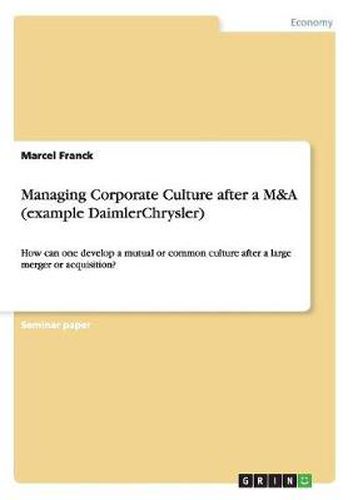Readings Newsletter
Become a Readings Member to make your shopping experience even easier.
Sign in or sign up for free!
You’re not far away from qualifying for FREE standard shipping within Australia
You’ve qualified for FREE standard shipping within Australia
The cart is loading…






Seminar paper from the year 2007 in the subject Business economics - Business Management, Corporate Governance, grade: 2,0, Nurtingen University (International Management, Intercultural Communication), 10 entries in the bibliography, language: English, abstract: In terms of globalization, enterprises have to be aware of their own identity, values and thoughts and develop a grasp for interaction with foreign cultures. So it’s not only some kind of business behavior necessary, it is also important to know something about the values, morals and attitudes for a better interaction. Even more important is a survey, if you plan a merger or an acquisition with a foreign company. Researches proof, that 50-70 % of all mergers don’t succeed. This essay deals with the difficulty of consolidating two different corporate cultures to one common culture. In order to visualize this issue, DaimlerChrysler is taken as an example. Culture is an everyday thing , it is present in every situation. It is a guideline for living together in large groups, giving rules to act and behave. In most instances these facts are not written down but unexpressed rules. There are many definitions in literature. The most widespread definition is likely Culture refers to the cumulative deposit of knowledge, experience, beliefs, values, attitudes, meanings, hierarchies, religion, notions of time, roles, spatial relations, concepts of the universe, and material objects and possessions acquired by a group of people in the course of generations through individual and group striving . Already the Egyptians and Romans created their own distinct hierarchies, laws, knowledge bases and values and tried to preserve it over several hundred years. Culture is needed to organize and administrate a group of people or whole population. Nowadays this lead to sophisticated cultures in every country of the world. These cultures are non-static grown individual reflections of society that are always adapting to their enviro
$9.00 standard shipping within Australia
FREE standard shipping within Australia for orders over $100.00
Express & International shipping calculated at checkout
Seminar paper from the year 2007 in the subject Business economics - Business Management, Corporate Governance, grade: 2,0, Nurtingen University (International Management, Intercultural Communication), 10 entries in the bibliography, language: English, abstract: In terms of globalization, enterprises have to be aware of their own identity, values and thoughts and develop a grasp for interaction with foreign cultures. So it’s not only some kind of business behavior necessary, it is also important to know something about the values, morals and attitudes for a better interaction. Even more important is a survey, if you plan a merger or an acquisition with a foreign company. Researches proof, that 50-70 % of all mergers don’t succeed. This essay deals with the difficulty of consolidating two different corporate cultures to one common culture. In order to visualize this issue, DaimlerChrysler is taken as an example. Culture is an everyday thing , it is present in every situation. It is a guideline for living together in large groups, giving rules to act and behave. In most instances these facts are not written down but unexpressed rules. There are many definitions in literature. The most widespread definition is likely Culture refers to the cumulative deposit of knowledge, experience, beliefs, values, attitudes, meanings, hierarchies, religion, notions of time, roles, spatial relations, concepts of the universe, and material objects and possessions acquired by a group of people in the course of generations through individual and group striving . Already the Egyptians and Romans created their own distinct hierarchies, laws, knowledge bases and values and tried to preserve it over several hundred years. Culture is needed to organize and administrate a group of people or whole population. Nowadays this lead to sophisticated cultures in every country of the world. These cultures are non-static grown individual reflections of society that are always adapting to their enviro